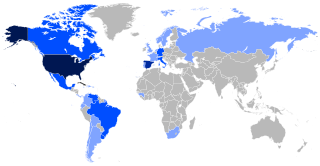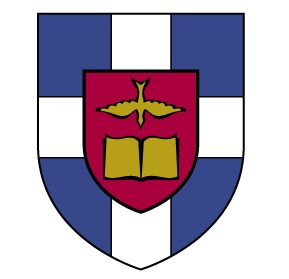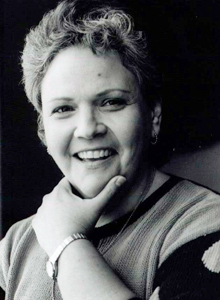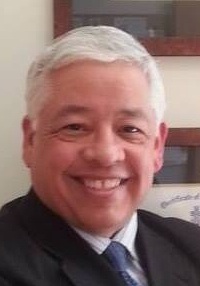Liberation theology is a theological approach emphasizing the "liberation of the oppressed". It engages in socio-economic analyses, with social concern for the poor and political liberation for oppressed peoples and addresses other forms of perceived inequality.

The term Hispanic refers to people, cultures, or countries related to Spain, the Spanish language, or Hispanidad broadly. In some contexts, especially within the United States, "Hispanic" is used as an ethnic or meta-ethnic term.
The Christian left is a range of Christian political and social movements that largely embrace social justice principles and uphold a social doctrine or social gospel based on their interpretation of the teachings of Christianity. Given the inherent diversity in international political thought, the term Christian left can have different meanings and applications in different countries. While there is much overlap, the Christian left is distinct from liberal Christianity, meaning not all Christian leftists are liberal Christians and vice versa.

Cubans are people from Cuba or people with Cuban citizenship. Cuba is a multi-ethnic nation, home to people of different ethnic, religious and national backgrounds.
Christianity is the most widely professed religion in Cuba, with Catholicism being its largest denomination. A significant share of the Cuban population is either non-religious or practices folk religions.
Latinos and Hispanics are predominantly Christians in the United States. Specifically, they are most often Roman Catholic. According to a Public Religion Research Institute study in 2017, the majority of Hispanic and Latino Americans are Christians (76%), and about 11% of Americans identify as Hispanic or Latino Christian.
Anthony B. Pinn is an American professor working at the intersections of African-American religion, constructive theology, and humanist thought. Pinn is the Agnes Cullen Arnold Professor of Humanities and Professor of Religious Studies at Rice University. He is founder and executive director of the Center for Engaged Research and Collaborative Learning in Houston, Texas, and Director of Research for the Institute for Humanist Studies in Washington, D.C.

The Southern Baptist Theological Seminary (SBTS) is a Baptist theological institute in Louisville, Kentucky. It is affiliated with the Southern Baptist Convention. The seminary was founded in 1859 in Greenville, South Carolina, where it was at first housed on the campus of Furman University. The seminary has been an innovator in theological education, establishing one of the first Ph.D. programs in religion in the year 1892. After being closed during the Civil War, it moved in 1877 to a newly built campus in downtown Louisville and moved to its current location in 1926 in the Crescent Hill neighborhood. In 1953, Southern became one of the few seminaries to offer a full, accredited degree course in church music. For more than fifty years Southern has been one of the world's largest theological seminaries, with an FTE enrollment of over 3,300 students in 2015.
Justo Luis González is a Cuban-American historical theologian and Methodist elder. He is a prolific author and an influential contributor to the development of Latin American theology. His wife, Catherine Gunsalus González, is a professor emerita at Columbia Theological Seminary, and the two have co-authored several books.
George E. "Tink" Tinker is an American Indian scholar of the Osage Nation who taught for more than three decades at the Iliff School of Theology, a United Methodist Church theological school, where he focused his scholarship on the decolonization of American Indian Peoples. The Tinker family name is deeply embedded among the Osage.

Ada María Isasi-Díaz was a Cuban-American theologian who served as professor emerita of ethics and theology at Drew University in Madison, New Jersey. As a Hispanic theologian, she was an innovator of Hispanic theology in general and specifically of mujerista theology. She was founder and co-director of the Hispanic Institute of Theology at Drew University until her retirement in 2009.

Edwin David Aponte is a Puerto Rican-American cultural historian, religious studies scholar, and contributor to the development of Christianity among Hispanic and Latino/a Americans. His research focuses on the interplay between religion and culture, especially Hispanic/Latino(a) religions, African-American religions, North American religious history, and congregational studies. He is one of a small number of U.S. Hispanic historians of Christianity.
Stacey M. Floyd-Thomas is an American author and educator. She is associate professor of ethics and society at Vanderbilt Divinity School and the Graduate Department of Religion at Vanderbilt University in Nashville, Tennessee. Floyd-Thomas is a Womanist Christian social ethicist whose research interests include Womanist thought, Black Church Studies, liberation theology and ethics, critical race theory, critical pedagogy and postcolonial studies.
Luis G. Pedraja is a Cuban-born theologian, philosopher, author, scholar and educator. Pedraja is an influential contributor to the development of Latino/a theology. He is also noted for his work in process philosophy and postmodernism, as well as his work in higher education.

Grace Ji-Sun Kim is a Korean-American theologian and Professor of Theology at Earlham School of Religion, Richmond, Indiana. She is best known for books and articles on the social and religious experiences of Korean women immigrants to North America.
Roberto Segundo Goizueta is a Cuban American Catholic theologian currently holding the Margaret O'Brien Flatley Chair in Catholic Theology at Boston College. Some of his specialties include Latino(a) theology and Christology.
Dennis P. McCann is the Wallace M. Alston Professor of Bible and Religion at Agnes Scott College in Atlanta/Decatur, Georgia, where he teaches in the fields of religious social ethics, comparative religious ethics, philosophy of religion, and Catholic studies. Before his tenure at Agnes Scott College beginning in 1999, McCann was Professor of Religious Studies at DePaul University in Chicago. In 1992 he was named the first annual holder of the Wicklander Chair in Business and Professional Ethics at DePaul University.

Willie James Jennings is an American theologian, known for his contributions on liberation theologies, cultural identities, and theological anthropology. He is currently an associate professor of systematic theology and Africana studies at Yale University.
Joerg Michael Rieger is a German and American professor of Christian theology whose work emphasizes economic justice and political movements. Rieger is also an ordained minister of the United Methodist Church.
María Pilar Aquino is a Catholic feminist theologian. She is currently Professor Emerita, Theology and Religious Studies, at the University of San Diego. Her primary areas of teaching and research were liberation theologies, social ethics, and feminist theologies.







